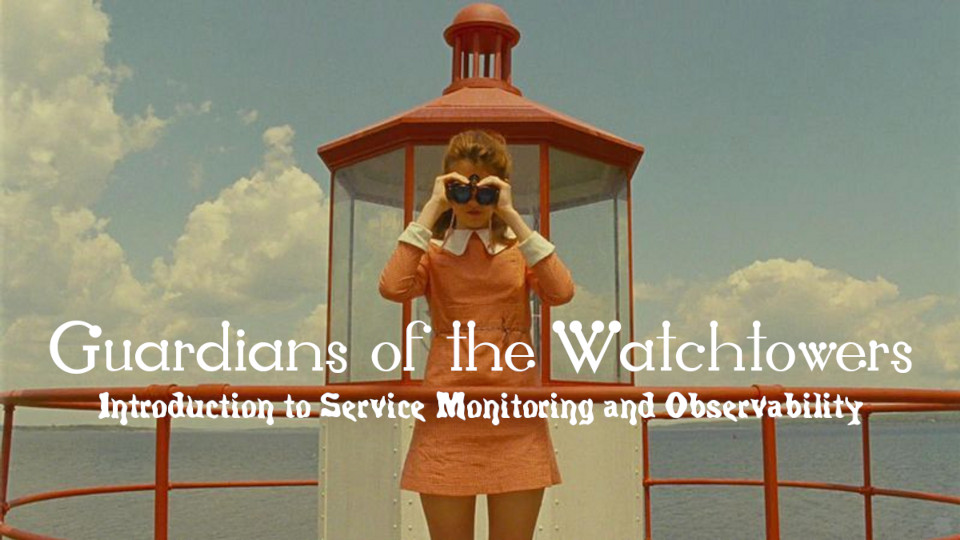Guardians of the Watchtowers: Introduction to Service Monitoring and Observability

Tickets are no longer available for this event.
View upcoming events or subscribe to our events calendar to make sure you catch the next one.
Event description
Knowing what’s happening on the computers you’re responsible for is a critical part of knowing how to care for and maintain any IT infrastructure. Learn how to automatically monitor and alert on operational issues such as resource exhaustion before they take down your servers and applications. In this workshop, you’ll learn about the “four golden signals” of observability, you’ll be introduced to time series databases and metrics collection with Prometheus, and you’ll learn how to create beautiful charts and graphs from that data with Grafana. Together, these free, industry-standard tools comprise the foundation of all modern and cloud-native IT monitoring stacks.
Workshop Description
Every computer program needs certain resources to operate well, like memory and disk space and CPU cycles. This is true both for simple programs on your laptop and also for complex, cloud-native systems like those that run in massive compute clusters in public cloud or on-premises datacenters. On a single computer, tools like the Activity Monitor on macOS or the Task Manager on Windows can report which applications are taking up what amount of specific resources on your computer in near real-time, helping you keep watch over your digital domain. When you need to monitor whole fleets of servers, though, you need tools that can scrape or collect the same information from those servers over a network.
In decades past, IT teams were often limited to static data sets to perform tasks like asset tracking. As applications grew more complex, performance and reliability metrics became increasingly important, so instrumentation, profiling, and visualization tools like dedicated health and readiness checks and flame charts were developed to help engineers figure out how to both optimize the code they wrote and how to integrate it with other systems more seamlessly. Today, specialized frameworks and burgeoning standards like OpenTelemetry are designed to give system operators more visibility into both the current and historical usage trends and patterns of the resources their services need to run well. Equipped with this information, they can make better capacity planning decisions for the future or even help identify anomalous events like security breaches, bugs in code, and other subtle issues that might be hard or impossible to track down otherwise.
In this workshop, you’ll be introduced to the concepts and practices of observability for infrastructure at any level of scale. You’ll learn about the “four golden signals”—latency, traffic, errors, and saturation—and why they matter. Like the four Quarters that are called to cast a magical circle, each golden signal has a particular focus and almost elemental meaning. You’ll learn how to install and configure Prometheus, the open, industry-standard metrics collection solution on which many commercial offerings are based, along with its accompanying components like Alertmanager, metric exporters, and supplemental software like Grafana that can query Prometheus’s time series database to reveal trends, patterns, or anomalies in your systems’ stability over time. Finally, to make sense of all this data, you’ll get an introduction to PromQL, the purpose-built Prometheus Query Language used for everything from triggering alerts to making custom queries so you’ll always be able to know exactly what’s going on in your infrastructure when you need to.
As this is a remote/online-only event, there is no physical class space, but attendance is still limited to 15 students, so purchase your ticket now to reserve your spot.
To participate in our webinars, you will need access to a modern Web browser such as an up-to-date copy of Mozilla Firefox or Google Chrome. You will also need a reliable Internet connection. We recommend disabling Wi-Fi and plugging your computer in to a hard-wired Ethernet network cable for the duration of the webinar, if possible.
If you would like to share your video screen or appear on camera, you will need to have and activate your own camera, such as the one built-in to many modern laptops. Similarly, to speak with the rest of the webinar participants, you will need a microphone. If you do choose to activate your microphone, we ask that you please plug in headphones/ear buds or use a headset in order to help reduce audio feedback loops that can degrade the webinar experience for other participants.
Please refer to our workshops and webinars FAQ for additional tips and advice before you join the video conference.
As with all Tech Learning Collective events, racism, queerphobia, transphobia, sexism, “brogrammer,” “manarchist,” or any kind of similarly awful behavior will result in immediate removal from class without a refund. Please refer to our lightweight social rules for details on our strictly enforced no-tolerance policy against bigotry of any kind.
About Tech Learning Collective
Tech Learning Collective is an apprenticeship-based technology school that trains politically self-motivated individuals in the arts of hypermedia, Information Technology, and radical political practice. We offer unparalleled free, by-donation, and low-cost computer classes on topics ranging from fundamental computer literacy to the same offensive computer hacking techniques used by national intelligence agencies and military powers (cyber armies). For more information and to enroll, visit TechLearningCollective.com.
Performances by
- New York NY United States
Presented by
- New York NY United States